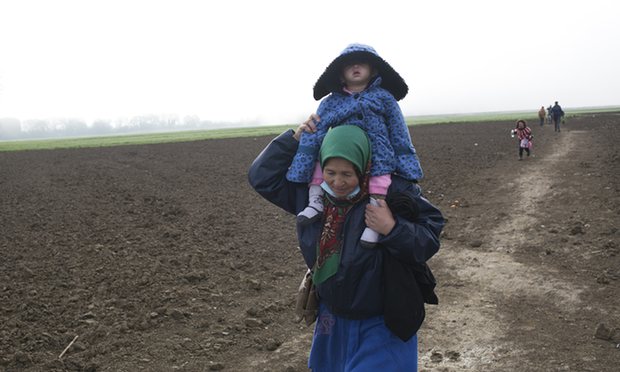
A refugee walks to the Greek border with Macedonia at Idomeni, where more than 10,000 others are stuck. Photograph: Petros Giannakouris/AP
Quelle: The Guardian
Those fleeing the war in Syria will avoid Greece: ‘The price of crossing is just going to be more expensive than before’
Syrian refugees have reacted with defiance and confusion to the proposed EU-Turkey deal that would see asylum-seekers returned to Turkey after arriving in Greece.
Greece has been the main gateway to Europe for several hundred thousand Syrians over the past year, but the new deal would theoretically see their path blocked. Syrians would be permitted only to reach Europe by a process of formal resettlement – with one Syrian resettled in Europe for every Syrian readmitted from Greece by the Turkish government.
In interviews with the Guardian, some Syrians in Turkey said that they would continue to try for Greece undeterred – given that their passage is already fraught with legal challenges. Others argued their countrymen would simply try other routes, sceptical that Europe would faithfully uphold its promise to resettle people.
Some also highlighted how addressing the main causes of migration to Europe – the war in Syria and a lack of access to the labour market for refugees in Turkey and Jordan – remained the key for solving the situation.
Muna, a 23-year-old Syrian student who has been trying to leave for Greece from Turkey for a week, said she and others still intended to make the journey. “The trip is illegal anyway, so different rules are not going to deter us,” said Muna, who asked not to disclose her surname. “We as Syrians are used to finding ways round rules now anyway.”
Muna said she would not consider taking a different route, and doubts the new scheme will do much to deter other Syrians from trying to reach Europe through Greece, even if there are some deportations. “I am going to be in a hurry because of this stuff, just in case they start to put it into practice,” said Muna, who is from Damascus. “But people who are not afraid of getting into a boat there, of course are not afraid of these kind of rules.”
But another Syrian currently in Turkey said he had no interest in reaching Europe now. “I have nothing to do in Europe,” said Khalaf, an 18-year-old from Hama, living in a refugee camp on Turkey’s southern border. “I’m waiting to go home as soon as possible and that’s it.”
One Syrian who reached Greece by boat last year, Nasser Masoud, reckoned that Syrians would simply try other routes if it turned out that those who were returned to Turkey would not be given access to the resettlement scheme. “This way, no one will go to Greece by sea,” said Masoud, an artist currently in Germany with his wife and two small children. “They will not use Greece any more – but they will try another way to Europe.”
Other conceivable routes include the Libya-Italy boat journey; a lesser-used route from Turkey to Italy; the land border with Bulgaria; and the maritime journey to Ukraine and the eastern Balkans via the Black Sea.
Baz, a 27-year-old Syrian journalist living in southern Turkey, agreed that smugglers would find other routes – and predicted an increase in attempts to use fake documents to reach Europe by air.
“The boats are the cheapest way, but people are using many different ways – fake passports, IDs, other smuggling routes – to get into the EU,” said Baz. “The price of crossing is just going to be more expensive than before.”
Baz said that any scheme that sped up resettlement of refugees currently in Turkish refugee camps was a positive thing – but he doubted that the EU would live up to its side of the bargain. “This will be the same as plans for distributing the refugees between the European countries,” Baz said, in a reference to the EU’s failed relocation schemes, “which are still just words on paper.”
Mohamed Salih Ali, the coordinator of an NGO called the Association for Solidarity with Syrian Refugees, was even more despondent about the deal.
“The Syrians have become a commodity traded and sold in the international bazaar but no one is thinking of solving the causes of the problem,” said Salih Ali. “Everyone is thinking about how to throw the problem on the other.”
